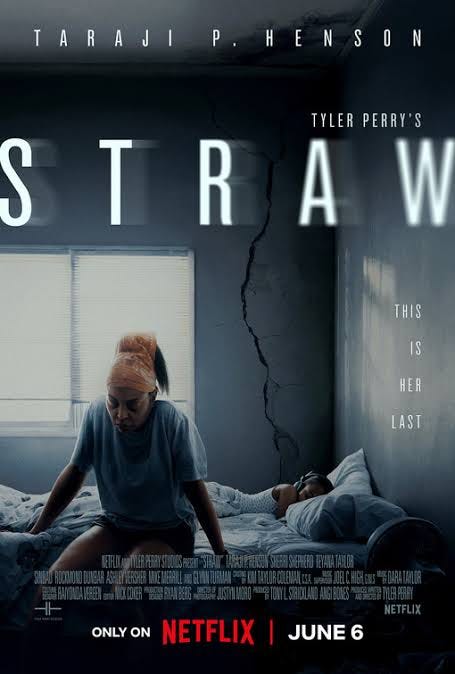Movie Review: Straw - a movie worthy of your time
By Williams Peniel
Not all powerful stories come dressed in comfort. Some arrive like Straw - loud in its silence, heavy in its honesty, and unrelenting in what it forces you to confront. This is a film that does not ask for your approval. It demands your attention. This is a movie worth seeing
I had been anticipating Straw from the moment it was announced, not just because of the cast lineup, but because I have always been drawn to Tyler Perry’s storytelling. So when it finally dropped on Netflix, I did not wait for the hype or viral reactions to tell me what to expect. I watched it immediately. And now that the online frenzy has kicked in, I am especially grateful I saw it early, before the noise, before the think pieces. That way, I can speak from a clear place, and honestly say: this film is worth every minute.
Released in 2025 and directed by Perry himself, Straw tells the story of Janiyah Willtkson, played by Taraji P. Henson, a single mother whose life spirals out of control in just one day. She loses her job, faces eviction, watches her daughter suffer a medical emergency, and even witnesses a robbery. Her final breaking point comes when she tries to cash her paycheck and is denied because she lacks valid ID. Pushed to her limit, she pulls a gun, leading to a tense, heartbreaking hostage situation inside a bank.
From the very beginning, Straw grips you with its raw emotional weight. But what makes it unforgettable is how deeply it explores grief, mental health, and the unseen layers of personal suffering. It becomes clear, as the story unravels, that Janiyah is not just reacting to a bad day, she is carrying years of unhealed trauma. A devastating twist even suggests that her daughter may not be alive, which reframes everything we have seen. Perry masterfully blurs the lines between reality and psychological collapse, forcing viewers to sit with the discomfort of uncertainty.
The film also does not shy away from holding a mirror up to society. Systemic oppression, economic hardship, and emotional isolation form the backbone of Janiyah’s crisis. From the indifference of institutions to the harsh judgments from those around her, Perry exposes how the world often fails people who are already barely surviving, especially Black women.
Still, it is not all doom and despair. At the heart of the chaos is motherhood - complex, painful, and fiercely protective. Every decision Janiyah makes, no matter how desperate, is for her daughter. Perry refuses to glamorize her struggle; instead, he shows the loneliness and emotional toll that so often comes with being the one who holds it all together.
One of the most powerful threads woven through the film is how society responds to crises. No one asks Janiyah why she is doing what she is doing. No one pauses to see the woman behind the act. And that silence, that refusal to understand, makes the story all the more heartbreaking. It is a bold commentary on how quickly we criminalize people instead of acknowledging their pain.
Taraji P. Henson delivers a performance that is nothing short of breathtaking. You do not watch her, you feel her. Every tremble, every glance, every silence says more than dialogue ever could. She is supported by a strong cast: Sherri Shepherd brings warmth and empathy as the bank manager, while Teyana Taylor grounds the film with her calm, intuitive presence as the negotiator. The visuals are also worth mentioning - moody and intimate, shot in a way that makes every scene feel claustrophobic and personal.
Despite the emotional impact and positive audience reception, Straw currently holds a disappointing 47% rating on Rotten Tomatoes, which is not surprising as Perry’s recent work has often faced tough criticism from reviewers, but his stories continue to land deeply with viewers. In fact, Straw has a 73% audience score, and that says everything. The people it was made for felt it. And that matters.
Two lines from the film have stayed with me:
“People don’t know how expensive it is to be poor.” - Isabella, an elderly bank customer.
“Black women always have something to get over.” - Janiyah.
These were not just quotable moments, they were truths. Heavy, honest, and unshakable.
By the time the film ended, I was not looking for closure. I was sitting with grief, questions, and a strange sense of clarity. Perry does not tie the story up in a bow, because life does not work that way. And in that unresolved space, I imagined my own ending. One where Janiyah’s pain is finally seen. One where compassion wins.
Would I recommend it? Without hesitation. If you are ready for something raw, timely, and deeply human, this is it. Straw may not be a feel-good movie, but it is a necessary one. I give it an eight over ten rating, because sometimes the most important stories are not the easiest to watch, but they are the ones that stay with you.


